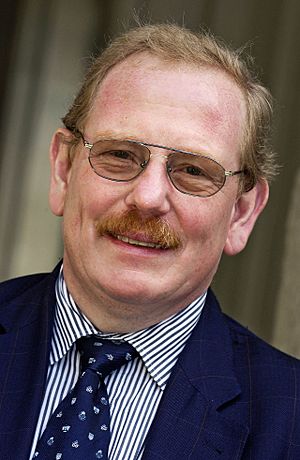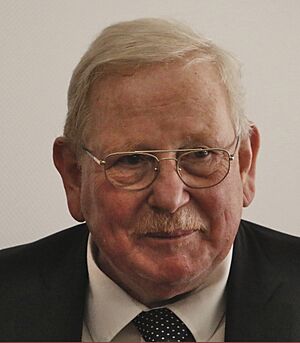Reinhard Genzel facts for kids
Quick facts for kids
Reinhard Genzel
|
|
|---|---|

Genzel in 2012
|
|
| Born | 24 March 1952 Bad Homburg vor der Höhe, West Germany (now Germany)
|
| Education |
|
| Known for | Infrared astronomy Submillimetre astronomy |
| Awards |
|
| Scientific career | |
| Fields | Astrophysics |
| Institutions | Max Planck Institute for Extraterrestrial Physics University of California, Berkeley |
| Thesis | Beobachtung von H2O-Masern in Gebieten von OB-Sternentstehung (1978) |
| Doctoral advisor | Peter Georg Mezger |
Reinhard Genzel (born March 24, 1952) is a famous German astrophysicist. He is a co-director at the Max Planck Institute for Extraterrestrial Physics and a professor at the LMU. He also used to be a professor at the University of California, Berkeley.
In 2020, he won the Nobel Prize in Physics. He shared this award with Andrea Ghez and Roger Penrose. They won for discovering a supermassive object at the very center of our galaxy, the Milky Way. This object is now known to be a black hole.
Life and Education
Reinhard Genzel was born in Bad Homburg vor der Höhe, Germany. His father, Ludwig Genzel, was also a professor who studied how materials behave.
Reinhard Genzel studied physics at the University of Freiburg and the University of Bonn. He earned his PhD in 1978, focusing on radio astronomy. He did this research at the Max Planck Institute for Radio Astronomy.
After finishing his studies, he worked at the Harvard-Smithsonian Center for Astrophysics in Cambridge, Massachusetts. From 1981, he became a professor in the Physics Department at the University of California, Berkeley.
In 1986, he moved back to Germany. He became a director at the Max-Planck-Institut für extraterrestrische Physik in Garching. He also taught at the Ludwig-Maximilians-Universität München and has been an honorary professor there since 1988. He continued to have a part-time role at the University of California, Berkeley, until 2016.
Discoveries in Space
Reinhard Genzel studies space using infrared and submillimetre astronomy. These are ways to look at light that our eyes can't see. He and his team also create new tools and instruments for studying space from Earth and from space.
They used these tools to watch how stars move around the center of our Milky Way galaxy. They focused on an area called Sagittarius A*. They found that these stars were orbiting something very, very heavy. This massive object is now known to be a black hole.
In 2018, Reinhard Genzel and his team reported something exciting. They watched a star called S2 as it orbited the black hole, Sagittarius A*. The star moved incredibly fast, reaching speeds of about 7,650 kilometers per second! This is about 2.55% of the speed of light.
This fast movement allowed them to test Albert Einstein's theory of general relativity. Einstein's theory predicts that light from objects moving very fast or near strong gravity will shift in color (called redshift). Genzel's team found that the star's light shifted just as Einstein's theory predicted. This gave more proof that Einstein's ideas about gravity and space are correct.
Awards and Honors
Reinhard Genzel has received many important awards for his work. Here are some of them:
- Otto Hahn Medal, 1980
- Newton Lacy Pierce Prize, 1986
- Gottfried Wilhelm Leibniz Prize, 1990
- Prix Jules Janssen, 2000
- Stern Gerlach Medal, 2003
- Balzan Prize for Infrared Astronomy, 2003
- Albert Einstein Medal, 2007
- Shaw Prize, 2008
- Karl Schwarzschild Medal, 2011
- Crafoord Prize, 2012
- Tycho Brahe Prize, 2012
- Harvey Prize, 2014
- Herschel Medal, 2014
- Nobel Prize in Physics, 2020
- Bavarian Maximilian Order for Science and Art, 2021
Scientific Groups
Reinhard Genzel is also a member of many important scientific groups around the world:
- Fellow of the American Physical Society, 1985
- Foreign member of the Académie des Sciences (France), 1998
- Foreign member of the United States National Academy of Sciences, 2000
- Member of the Deutsche Akademie der Naturforscher Leopoldina, 2002
- Senior member of the Bayerische Akademie der Wissenschaften, 2003
- Foreign member of the Royal Spanish Academy of Sciences, 2011
- Foreign member of the Royal Society of London, 2012
- Member of the Pontifical Academy, 2020
See also
 In Spanish: Reinhard Genzel para niños
In Spanish: Reinhard Genzel para niños


